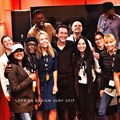#LadiesofLoeries: “SA's bizarre advertising industry demographic” - Neo Segola

It’s no secret that the local creative industry is severely lacking in diversity. I chatted to Segola on her current favourite aspects of work, the importance of acknowledging ‘black tax’ and the Loeries’ Open Chair initiative’s role in reinforcing the message that young, female creatives’ voices are valid.
 Share your career highlights, in a nutshell.
Share your career highlights, in a nutshell.
In recent years, I’ve gravitated towards accounts of national interest, working on clients such as IDC, Telkom and most recently, South African Tourism. You’d be amazed at how sexy those brands are in their own right.
The key thing for me is that when you get the opportunity to create work that effects real change, whose socio-economic impact is visible and tangible, one just tends to sleep better at night! There’s a highlight right there.
 You certainly know your stuff, having been on the Apex and Loeries judging panel yourself in the past. What do these ways of celebrating local creativity bring to the local creative industry, as well as to the general SA public?
You certainly know your stuff, having been on the Apex and Loeries judging panel yourself in the past. What do these ways of celebrating local creativity bring to the local creative industry, as well as to the general SA public?
These awards are critical. They are an important way for the industry to benchmark itself and maintain the high international standards South Africa has, for years, been known for. Besides, how else do we thank ourselves for the long, torturous hours?
 Your colleague and fellow creative director at FCB Africa Collette Wasielewski describes you as follows:
Your colleague and fellow creative director at FCB Africa Collette Wasielewski describes you as follows:The only black female creative director to be counted across all the big name agencies in the country... who I’m lucky to work alongside, is akin to a unicorn.
Do you often feel like that rare – if not imaginary – being yourself, due to the industry's demographics?
Being that rarity is possibly the most uncomfortable thing for me, as it shines a spotlight on South Africa’s bizarre advertising industry demographic. How on earth does that happen in Africa? Most importantly, how do we change it? We’re sitting here with huge gender and racial diversity gaps in a country whose majority is both black and female, where white guys are talking to black people about black issues.
Ludicrous! I love that I get to co-create and co-plot with someone like Collette, who’s also passionate about those very issues – every single day!
The sooner we have more black women not only as a brown puddle at the bottom of the ladder but all the way up into executive boardrooms, the sooner the work we produce will be more resonant with the people we’re creating it for and the sooner the right conversations will be sparked.
 On that note, explain the importance of your role as a mentor at this year's Open Chair event and the initiative overall.
On that note, explain the importance of your role as a mentor at this year's Open Chair event and the initiative overall.
I cannot overstate the importance of this initiative. To see all those young women in one room, who have great aspirations about building careers in the industry, got me excited at the sheer possibilities for changing the face of South Africa’s advertising landscape.
Unfortunately, agencies are structured in such a way that precludes actual career growth and progress for women. Salary gaps, sexism, objectification, bullying and being consistently made to feel that your voice isn’t worth a place at the boardroom table drives people to leave it.
Building a career in advertising, especially on the creative end of things, is an uphill battle. The daily challenges that women encounter within this industry, particularly black women, create the situation we’re sitting with now: that ‘unicorn’ effect. Open Chair represents a great opportunity to change all that. It represents an opportunity to nurture these talented and ambitious young minds, equip them with practical tools to survive these ad streets, build up their confidence and instill in them the kind of tenacity that is required to stay the course. Open Chair, their survival is on you!
 What other steps need to be taken now in order to guarantee not only more female creatives, but more black female creatives, in SA?
What other steps need to be taken now in order to guarantee not only more female creatives, but more black female creatives, in SA?
The foundational barrier is economic. The young, vibrant minds we’re trying to attract can’t even afford tertiary education, let alone exorbitant ad school fees. Now isn’t that an obvious opportunity for agencies to stop paying lip service to ‘transformation’ and play an active role in facilitating young people’s entry into the industry? Let’s start in-agency academies. Let’s pay for AAA. Why can’t we?
Then, let’s talk about 'black tax'. This is the reality of millions of young black South Africans entering the workplace: You’re automatically on the back-footer. In a creative department, most creative directors won’t understand that a great portion of your salary goes towards family obligations. They won’t understand that that’s why you can’t work until 2am and be back at it at 8:30am because you can’t afford accommodation closer to work, much less a car. Hell, they’ll certainly not understand that you couldn’t make it to work because there was a taxi strike. Remuneration should be in line with those kinds of considerations. Naïve? Perhaps. Possible? Without a doubt!
 Share some advice for young local talent looking to step into your shoes.
Share some advice for young local talent looking to step into your shoes.
The industry doesn’t need more Neos. It needs Leratos, Palesas, Lebos and Margarets to get in there and make the things that make the pots happen, happen. And those of us who are here must never rest until we’ve found ways to facilitate the entry of these young people into the industry and enable them to sustain those careers. My advice? I don’t have much, except: Don’t be distracted, you matter and your voice is always valid. I’m also still trying to follow that advice.
We can all learn from and with Segola. Click here for more on her, here for our Loeries Creative Week Special Section, here for our #WomensMonth coverage, here to read the latest news uploaded to the FCB Africa press office and click through to their social media profiles: Twitter | Facebook




































